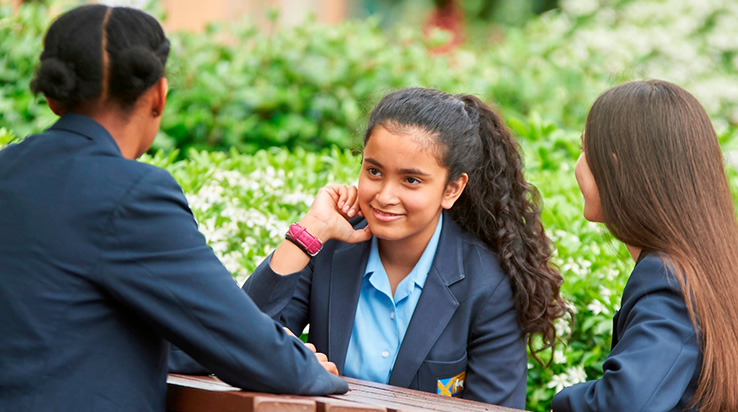
Why an early decision to implement Google Workspace across a large single sex girls’ school supported them during the pandemic… and how they are building this into their curriculum for the longer term.
The Background
St Albans Girls’ School (STAGS) is an 11-18 single sex girls’ comprehensive school – that became an Academy in 2011 – with a co-educational Sixth Form. With 1,350 students, the school is consistently placed within the Top 10% of schools nationally and following an Ofsted “Outstanding” judgement in 2013, became a National Teaching School in 2017, receiving World Class School accreditation in 2017 and the lead school in the Atlas Multi-Academy Trust in May 2018.
STAGS is a very special place with exceptional students, staff and governors. The school proudly celebrates and builds on its distinguished history (in the cathedral city of St Albans in Hertfordshire), combined with a focus on modern innovation to create a caring, vibrant and dynamic community.
Their students thrive on expert teaching, high quality facilities and a vast range of extracurricular activities, leading to the impressive academic results that they deliver each year. This is based on an ethos of setting high expectations for their students ensuring that there is no limit to what they can achieve. They develop an individuality and confidence amongst students right across the curriculum.
The school is committed to the highest standards of teaching and learning, achieved through a combination of challenge, support, encouragement and praise, to ensure that all students fulfil their potential. This is carried through “behind the scenes”, recognising the role that technology plays within a modern educational establishment, selecting RM as their technology partner in 2014. RM is now their sole support provider, helping the school manage their servers and Google Workspace (formerly known as G Suite), being an RM Unify customer from the outset – in 2014.
The move to Google Workspace
The school started using Google Workspace (then G Suite) in 2014, initially so that students and colleagues could access the same learning materials on both home and school devices, recognising the benefits of being able to return to editing documents from any device at any time of the learning process.
Taking people with you on such a journey can be challenging, but for STAGS they planned and implemented workshops with teams of colleagues where they demonstrated and answered questions on Google Workspace accessibility as well as how Microsoft Office features could be used in an enhanced format. They also redesigned their central storage areas and imported all Curriculum Resource folders onto Google Drive to enable access from all locations.
This worked well, and prior to the Coronavirus pandemic in March 2020, were using Google Workspace to varying degrees alongside Microsoft Office and a Windows file storage system. At this stage, Google Classroom was in wide use across the school but possibly under-utilised, although everyone could access the system remotely through CC4 access and the uptake for this was increased due to HTML5 CC4 Access via any device.
They benefited from this being culturally established within the STAGS ethos – having always confidently embraced any technology advancement.
“We like to think that we are a leader in this space. Both via specific departments and the school as a whole, we have an established system of trialling, integrating and testing new software, hardware and systems”.
Paul Kershaw, Deputy Head Teacher
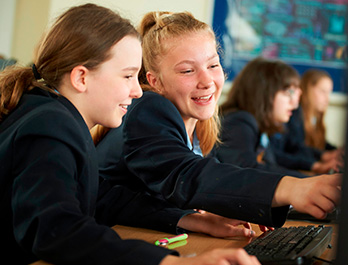
This ranges from “technology weeks” where teachers trial programmes and advancements in lessons to ensuring that all of their IT Team research and integrate the latest education enhancements.
RM research undertaken at the start of 2020 suggested that teachers nationally could be resistant to greater technology adoption in schools. This does not appear to have been the case at STAGS.
“We have always been very lucky to have colleagues that have always embraced technology to promote effectiveness”.
Paul Kershaw, Deputy Head Teacher
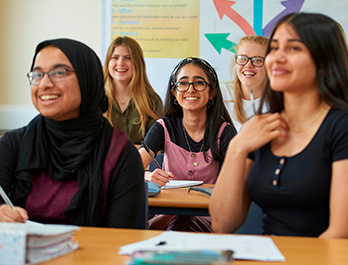
Examples of this include online communication systems – such as Google Forms for surveys and collaboration through Google Docs and Sheets – all firmly in place before Lockdown made these a necessity. They also now have a range of ‘COVID Keeps’ that they are integrating into their best practice and calendar for the 2021 academic year that are systems generated or adapted for Lockdown usage that have enhanced or promoted effectiveness and communications. These include (amongst others): Online Parents’ Evenings; Learner and Parent Voice Surveys; Information Evenings via Google Meet; Transparent Curriculum Enhancement via Google Classroom; Whole school community live assemblies; agency meetings via Google Meet and their whole school conference taking place entirely online for 2021 with outcomes including collaborative strategic materials and the development of hybrid Schemes of Learning for classroom and remote delivery.
Delivering Remote Learning
When the Prime Minister made his announcement on 18th March 2020 that schools would close their gates to all but the vulnerable and children of key workers, St Albans Girls’ School were in a reasonably strong position, in that they had already adopted Google Classroom across the school and had a remote desktop function in place for all users. They had also recently implemented Edulink which meant that they did not need the SIMS’ programmes to take class registers.
“It was very straightforward for us to adapt to remote learning, working and collaboration. We already had the storage, programmes and devices we needed (for colleagues, with distribution of devices for students to follow) as well as the skills required by our workforce for the transition”.
Paul Kershaw, Deputy Head Teacher
The final piece of the jigsaw was the integration of remote meeting software – which has now been fully introduced to enable effective communication between students, families, governors, peer schools, agencies and for professional development.
Google Workspace proved particular effective when it came to continuing staff meetings and when the school came to implement a live curriculum – given they had already made effective use of Google Classroom and online Home Learning distribution software.
“The confidence that colleagues and pupils had shown in using Google Classroom reassured me that we could adapt to remote learning and Google Meet-based lessons. This proved central to the success of our “Recovery Curriculum”, and I am proud to say that no learning time has been lost through the successive periods of remote provision”.
Paul Kershaw, Deputy Head Teacher
At a national level, one of the key enablers has been a modern, reliable computing device for all. Many schools have turned to Chromebooks as the solution – inexpensive, reliable, and easy to use – and STAGS is no different. Whilst the school have not yet moved to a fully 1-to-1 Chromebook scheme, they are heading in that direction through a pilot scheme for Years 7 and 8 in the 2021/22 academic year. This has been motivated by the increased learning resources Chromebooks provide in the classroom as well as at home. The school have also benefitted from being able to manage all of their devices from one portal, whilst ensuring that they are all protected at home and in the classroom through the RM SafetyNet Go filtering software designed specifically for Chromebooks.
“We have steadily developed an effective in-school system of Chromebook usage in lessons to enhance research and collaboration skills across all subjects. This has complemented our Mac suites for Film, Photography and Music lessons as well as Library Resource Centre technology facilities and six computer suites”.
Paul Kershaw, Deputy Head Teacher
As the diagram below illustrates, the school looked at remote learning in terms of both online provision as well as its role in monitoring student welfare. Both elements were made possible through the use of technology and their proclivity with Google Workspace programmes.
Remote Learning 2021
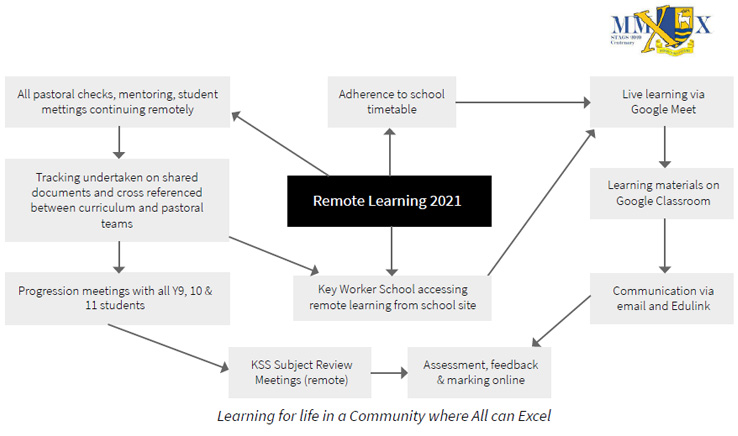
Their Schemes of Learning were delivered online using Google Meet in line with their established school timetable for the academic year. Students across all subjects, year groups and phases benefited from live learning via Google Meet with supporting materials on Google Classroom. All communications with students and families were undertaken via Googlemail and Edulink One with assessment, feedback and marking taking place online with bespoke methods dependent on departmental requirements.
Tracking of students’ engagement and welfare took place using Google Sheets with meetings about student progression over Google Meet. Specific progress review meetings were set up with all students in Years 9-11 and with KS5 students with subject teachers. Importantly, Key Worker students on site could engage with remote learning using the same methods and systems as students at home.
“The effectiveness of combing these programmes and systems was built on our prior knowledge of Google Workplace as well as the best practice we developed during Spring and Summer 2020 and gleaned from organisations such as RM as a result of their dealings with other schools”.
Paul Kershaw, Deputy Head Teacher
One example was that their initially ambitious lesson planning had to be adapted to ensure that students’ welfare was promoted after a long day of screen time. Learner Voice – a key component of their Recovery Curriculum – was used to hone and enhance remote learning experiences through the preference of specific programmes and systems that promoted progress in specific subjects as well as the Government’s National Tutoring Programme in core subjects.
Safeguarding and other school policies were all reviewed at the outset, with a new remote learning policy introduced to support the system they designed.
The Lessons Learnt
- Focus – for the IT Team at STAGS, they believe that the 100% switch from all Microsoft products to Google ones – rather than implementing a hybrid solution – is the most effective way to transition especially in relation to where files are kept and how they are accessed.
- Equip people with the skills they need – the Curriculum Lead at STAGS believes that the promotion of benefits and carefully designed training sessions where colleagues get to trial programmes live was integral to the success of their Google Workspace conversion. Both RM and Google provided many online instructional videos and research-based reports relating to education enhancement so that training programmes were easier to generate dependent on individual colleague requirements.
- Take people on the journey – this was critical for the success at STAGS. They achieved this by generating and monitoring working groups of educational support and teaching staff to trial content and then share new ideas in the context of the school’s needs. This proved more effective than just taking a general perspective and increased the potential for larger numbers of colleagues integrating the new systems and ideas into their general practice.
The Legacy
So much has been gained over the last twelve months that it would be doing a huge disservice to all the efforts that have been undertaken by teachers, school colleagues and pupils, to not build on this period. At STAGS they want staff and pupils to feel more comfortable trying out new technologies than before – for example, the periods of remote learning have made their use of Google Classroom immeasurably more robust across all subject areas.
Examples include recording and reviewing a database of ‘COVID Keeps’ to enhance systems when in full-time school-based learning; as well as developing a Chromebook in classrooms system to normalise blended learning practice which is central to most vocational industries.
All in all, the school feel blessed that they made the decisions that they did when they did, and are excited about the platform that this has established for them for the years ahead.
“Everyone in the school has had to give different methods a try during the pandemic and we are keen that they reflect on the thought process they went through and build on those as we all return to the classroom”.
Paul Kershaw, Deputy Head Teacher
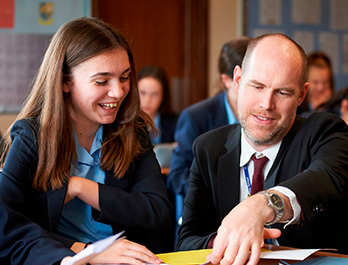
“We hope that our communities will recognise the need for investment in IT within schools, now that they have seen just how crucial it can be for the continued learning of children. We hope that blended and hybrid curriculum best practice will be embedded in pedagogical developments for classroom-based learning in the years to come and that technological educational enhancements continue to benefit all of our learners”.
Paul Kershaw, Deputy Head Teacher
Download a PDF of the case study